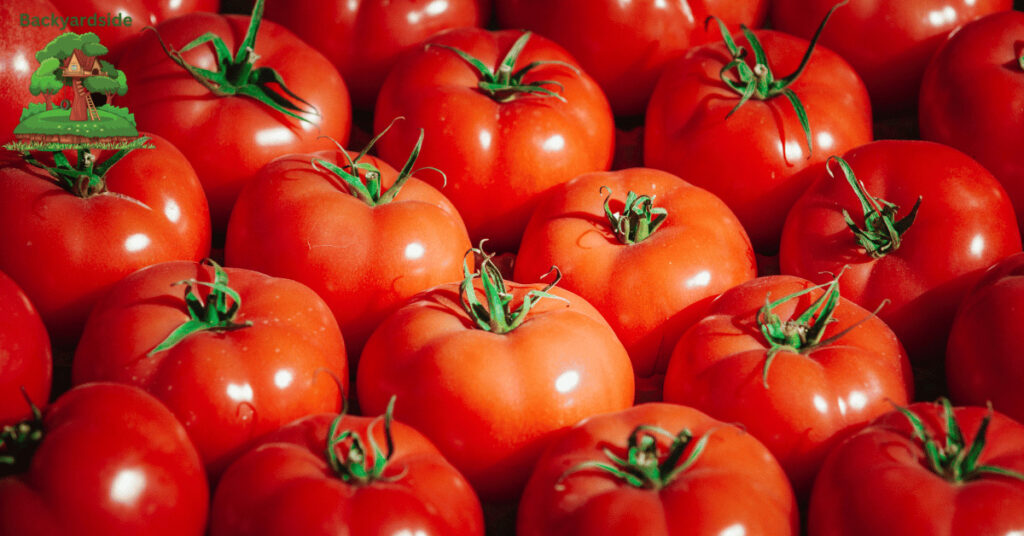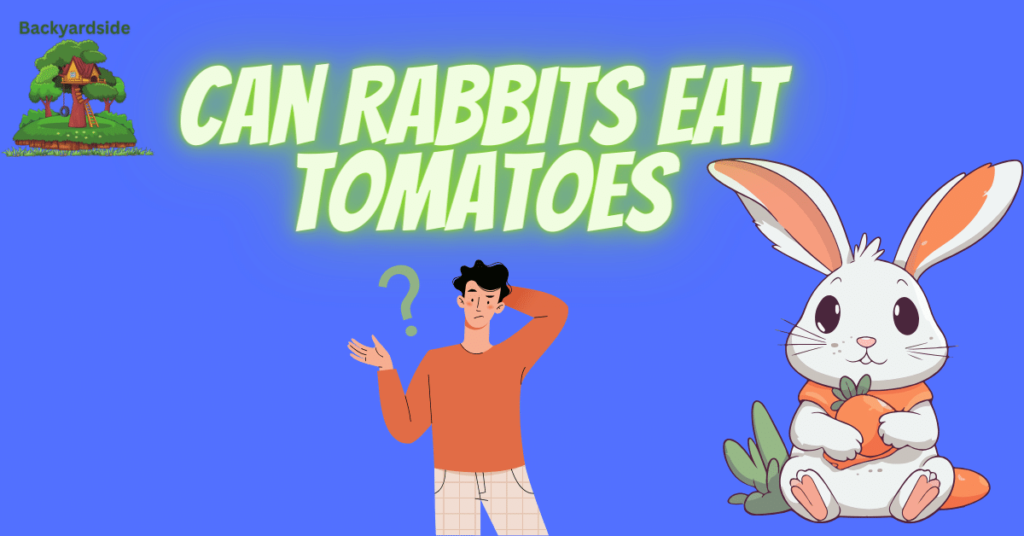In the world of pet lovers, a common query buzzing around is, “Can rabbits eat tomatoes?” It might seem like a simple yes or no question,
but the answer weaves through various dimensions of pet nutrition and safety. The discussion about whether or not rabbits should nibble on these juicy red fruits is filled with differing opinions and concerns. The fear of causing harm to our adorable bunnies by feeding them something their delicate tummies can’t handle is real and valid.
In this comprehensive guide, we dive deep into unraveling the truth, shunning the myths, and setting the facts straight. Can the humble tomato find a spot in your rabbit’s diet, or should it be crossed off the menu?
Stay with us as we navigate through expert insights, nutritional breakdowns, and practical tips, ensuring you’re equipped with all the information needed to make an informed decision for your fluffy friend’s diet.
Let’s embark on this journey to discover the role tomatoes can play in a rabbit’s diet, laying out all the pros and cons transparently, with your pet’s health as our paramount concern.
The Nutritional Landscape of Tomatoes

When pondering the question, “Can rabbits eat tomatoes?”, it’s crucial to first explore the nutritional landscape of tomatoes to gauge their compatibility with a rabbit’s dietary needs.So Tomatoes are a rich source of vitamins A and C, crucial for maintaining overall health and boosting the immune system. They also contain lycopene, a powerful antioxidant known for its various health benefits.
Nutritional Content of Tomatoes
A typical raw red, ripe tomato is packed with nourishment, but it’s light on calories – perfect for keeping your rabbit’s weight in check. To illustrate, a 100-gram serving of raw tomato consists of approximately 18 calories, and it is composed of about 95% water, ensuring your rabbit stays hydrated. The carbohydrate content stands at 3.89 grams, including 2.63 grams of sugar.
Also Read To Know More about : can other animals eat tomatoes
Relating Nutritional Aspects to Rabbits
But what do these figures actually mean for our fluffy friends? When we think about feeding tomatoes to rabbits, it’s crucial to dive into the numbers.
The carbohydrate and sugar content in tomatoes might be on the low side compared to other fruits, making it appear as a safe snack for bunnies. However, the sugar content, although low, we can’t be ignored.
Even a small amount, if eaten in excess, could lead to unwanted weight gain and other health issues in rabbits. Moderation is key here to ensure the health and happiness of our pets.
Comparison with Other Vegetables and Fruits
Now, how do tomatoes stand when weighed against other fruits and vegetables? Nutritional value-wise, tomatoes offer decent benefits. But when you stack them against veggies like cabbage, kale, and arugula, tomatoes are slightly overshadowed.
These vegetables bring to the table not just a wealth of nutrients but also come with less sugar content. That’s why these greens often take center stage in a rabbit’s regular diet. Fruits, including tomatoes, come into play as occasional delightful treats for our bunnies, bringing variety and excitement to their meals while ensuring their health is not compromised.
So, while tomatoes do provide certain essential nutrients, moderation is the keyword here.
The nutritional aspects of tomatoes paint a picture of a healthy, hydrating fruit filled with vitamins and antioxidants, but the sugar content nudges it into the treat category for rabbits, to be offered sparingly for maintaining optimal health.
Diving Deeper into Tomato Composition

As we continue our exploration into the appropriateness of tomatoes for rabbits, it’s time to delve deeper into the specific components of tomatoes. Understanding the intricate details of tomato composition helps in making an informed decision regarding their place in a rabbit’s diet.
Water, Protein, Fat, and Carbohydrate Content in Tomatoes
Ah Tomatoes are predominantly made of water, making up about 95% of their composition. This high water content can help keep rabbits hydrated. Despite their high moisture content, tomatoes provide less than one gram each of protein and fat per 100-gram serving, making them a low-calorie addition to a rabbit’s diet.
Highlighting the Sugar Content and Its Implications
The sugar content in tomatoes is another significant factor to consider. At 2.63 grams per 100 grams, it’s essential to moderate the intake of tomatoes for rabbits. While this sugar content is relatively low, overconsumption can lead to potential health issues, such as obesity and related complications.
Analyzing Different Tomato Forms: Raw, Sun-Dried, and Canned
When it comes to giving tomatoes to rabbits, the type of tomato matters a lot. Raw tomatoes top the list as the most suitable for bunnies.
They’re low in calories and sugar and high in water content, keeping your pet hydrated and healthy. But sun-dried tomatoes? That’s a different story.
A 100-gram serving loads up 258 calories and a substantial sugar bump to 37.6 grams. Canned tomatoes also have a bit more calories and sugar compared to their fresh counterparts. In a nutshell, sticking to fresh, raw tomatoes is your best bet for a happy, healthy bunny snack.
Unveiling the Risks
In the world of fruits and vegetables, not everything that seems nutritious and harmless is suitable for every creature. As we examine the issue of rabbits consuming tomatoes, it’s crucial to bring attention to the potential risks associated with tomato plants.
Explaining Toxins: Solanine and Tomatine
Tomato plants, especially the green parts like stems and leaves, contain solanine and tomatine, two harmful chemicals for rabbits. Solanine is prevalent in many plants of the nightshade family, which includes tomatoes. This toxin acts as a natural defense against pests, but it can be hazardous to rabbits, causing various adverse symptoms.
Parts Unsafe for Rabbits
The stems and leaves of the tomato plant are particularly dangerous for rabbits. Even green tomatoes, not fully ripened, should be avoided as they contain higher levels of solanine and tomatine. It’s imperative to ensure that only ripe, red tomatoes are given to rabbits, and even then, in moderation.
Symptoms and Signs of Poisoning
Imagine noticing your bunny suddenly drooling or spotting its pupils unnaturally dilated. Other alarming signs like weakness, a sudden loss of appetite, nausea, or even vomiting could follow. These are glaring red flags indicating that your rabbit might have ingested the toxic parts of a tomato plant, setting off a potential health emergency.
Just like us, every bite matters for our furry friends, and unfortunately, some bites can bring along a host of unwanted health issues. Ensuring immediate and prompt veterinary care at the hint of such symptoms is not just crucial, it’s a non-negotiable responsibility.
It stands as the decisive factor in ensuring the uninterrupted health and joyful bounding of your pet rabbit around your backyard, bringing smiles and warmth to your household. Your timely action could be a game-changer, making all the difference in your pet rabbit’s world!
Safe Consumption of Tomatoes by Rabbits

Understanding the potential risks is the first step towards ensuring safe and healthy tomato consumption for rabbits. Let’s explore the guidelines for safely integrating tomatoes into a rabbit’s diet.
Guidelines for Safely Feeding Tomatoes to Rabbits
To guarantee the safe feeding of tomatoes to rabbits, only offer ripe, red tomatoes, thoroughly washed and cut into appropriate sizes. This practice eliminates the risk associated with the toxic parts of the tomato plant and ensures that your rabbit is consuming a nutritious treat.
Emphasizing Portion Control and Monitoring
Portion control is paramount when feeding tomatoes to rabbits. Given the sugar content and caloric value, tomatoes should only be an occasional treat. Continuous monitoring is crucial to notice any adverse reactions or changes in your rabbit’s behavior and health.
Expert Opinions and Insights
Expert opinions echo the sentiment of moderation and cautious approach. Veterinarians and rabbit care experts agree that while tomatoes can be a part of a rabbit’s diet, ensuring that only the fruit is consumed, and in limited quantities, is essential for the well-being of your pet rabbit.
Alternatives and Additional Dietary Information
Navigating the realm of safe and nutritious food for rabbits goes beyond the tomato discussion. It’s fundamental to understand the broader picture of a balanced diet for these lovable pets.
Other Safe Fruits and Vegetables for Rabbits
Apart from tomatoes, various other fruits and vegetables are safe and nutritious for rabbits. These include arugula, cabbage, and kale, which are all rich in fiber and essential nutrients. Offering a variety of these alternatives ensures a balanced and healthy diet for your pet rabbit.
Balanced View on Including Tomatoes in a Rabbit’s Diet
While tomatoes can be a delightful treat for rabbits, they should not constitute a significant part of their diet. Ensuring a mix of different fruits and vegetables, alongside their primary food, hay, contributes to their overall well-being and nutritional balance.
Broader Context of a Rabbit’s Overall Nutrition
The role of tomatoes and other vegetables plays a secondary yet substantial part in a rabbit’s diet. Hay should form the majority of their dietary intake, ensuring they receive adequate fiber to maintain digestive health. Fruits and vegetables, including tomatoes, supplement this by providing additional nutrients and variety.
Case Studies or Research Insights
The scientific community has contributed valuable insights into the dietary needs and restrictions for rabbits.
Relevant Studies or Research
Research has delved into alternative diets for rabbits, including the effects of tomatoes on their health. Studies involving dehydrated tomato pulp and tomato pomace powder have shown promising results, particularly in lowering total cholesterol and LDL levels in rabbits.
Health Benefits and Potential Risks
While there are evident health benefits, it’s crucial to weigh them against the potential risks. The high sugar content in tomatoes underscores the importance of moderation to avoid issues related to obesity and other health complications.
Balanced View Based on Scientific Evidence
Taking into account the available scientific evidence, tomatoes can be part of a rabbit’s diet, but with cautious moderation. Understanding the research insights helps in making informed and balanced dietary choices for rabbits.
Practical Tips for Feeding Tomatoes to Rabbits
When it comes to the practicalities of feeding tomatoes to rabbits, some essential tips can help ensure a safe and healthy dietary addition.
Practical and Easily Implementable Tips
Ensure to feed only ripe, red tomatoes, adequately washed and cut. Observe your rabbit for any changes or adverse reactions to ensure their continued well-being.
Information on Type, Quantity, and Frequency
Opt for raw tomatoes as they have lower calorie and sugar content compared to sun-dried or canned varieties. Keep the quantity limited, offering tomatoes as an occasional treat rather than a regular part of their diet.
FAQS – Rabbits Eat Tomatoes
Can rabbits eat raw tomatoes?
Absolutely! Raw tomatoes are a-okay for your fluffy pals in moderation. They’re low in calories and high in water content, making them a refreshing treat. Just make sure they’re ripe and always wash them thoroughly to remove any pesticides.
Can rabbits eat a whole tomato?
Whoa, slow down there! Even though rabbits can enjoy tomatoes, offering a whole tomato might be a bit much. It’s always better to offer small, bite-sized pieces to ensure they don’t overeat. This way, they get to enjoy their treat without the risk of tummy troubles.
What vegetables can rabbits not eat?
Great question! There are a few no-go veggies for rabbits. Onion, garlic, and rhubarb are some examples. These can cause serious health issues, so it’s best to stick to rabbit-approved veggies and leafy greens like lettuce, basil, and parsley.
Conclusion
In the journey through understanding, if rabbits can eat tomatoes, several pivotal insights have unfolded. The nutritional benefits of tomatoes for rabbits are apparent, offering essential vitamins and minerals to their diet.
However, the lurking risks, primarily due to the sugar content and toxins present in green tomatoes and other plant parts, should not be overlooked.
The nutritional balance is the cornerstone for maintaining the health and vitality of your rabbit. While tomatoes can be an occasional treat, the emphasis on a diet rich in hay, supplemented by a variety of other safe vegetables and fruits, is non-negotiable.
Ensuring moderation and following practical feeding tips will safeguard your rabbit from potential health pitfalls.
Scientific studies lend a significant hand in making informed decisions, shedding light on both the positive and adverse impacts of tomatoes on rabbit health. The balance rests in cautiously navigating these insights and adapting them to the individual needs of your rabbit.
In summary, the art of feeding your rabbit tomatoes lies in the harmony of moderation, diversity, and continuous observation. It is a shared responsibility to prioritize the health and well-being of our adorable rabbits, ensuring they lead a joyful and robust life.
We urge you to carry this torch of knowledge further. Share the insights and information gleaned, contributing to a community of informed and caring rabbit owners. Let’s collectively ensure the well-being, happiness, and health of our furry friends, making the world a better place for them, one tomato at a time!

